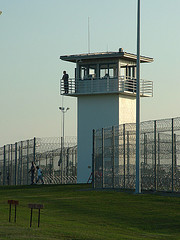The local chair of American Civil Liberties Union is calling for a federal review of Central Florida’s Internet Crimes Against Children task force.
Ret. Army Col. Mike Pheneger, the chair of the Greater Tampa Chapter of the ACLU, said there are many problems with these “To Catch a Predator”-style undercover stings, which are extremely popular in West/Central Florida.
Pheneger, who has also held ACLU leadership positions at the state and national level, said this: “The Justice Department (should) be asked to look into this, since this is federal money that’s involved here. Find out if they are following the rules, because it would appear they are not.”
 The Central Florida ICAC task force, under the authority of Polk County Sheriff Grady Judd, started reaching out to men who were simply posting perfectly legal ads on legitimate dating websites. A handful of judges have even criticized officers’ overreach, their “failing to follow procedures” during undercover operations, as well as methods used to nettle “a law-abiding citizen to commit a crime.”
The Central Florida ICAC task force, under the authority of Polk County Sheriff Grady Judd, started reaching out to men who were simply posting perfectly legal ads on legitimate dating websites. A handful of judges have even criticized officers’ overreach, their “failing to follow procedures” during undercover operations, as well as methods used to nettle “a law-abiding citizen to commit a crime.”
According to a 10 Investigates analysis, out of more than 1,200 Florida arrests since 2008, many of the subjects of the stings often had no previous criminal record and were able to avoid jail time. In fact, many prosecutors have shown leniency, based on the facts of the case and the likelihood the accused might actually commit a crime on a real child.
“It’s important to put actual sex offenders in jail,” Pheneger added. “Law enforcement should be going after those people, not trying to entice people who have shown no disposition to any kind of criminal behavior toward children.”
Many local agencies, such as the Hillsborough County Sheriff’s Office and the Pasco County Sheriff’s Office, do not take part in these sting operations. Rather, they focus their efforts on more immediate dangers in the cyber crime realm, such as child porn and sex trafficking.
ICAC guidelines, which were obtained by 10 Investigates through court records, demonstrate that these online undercover stings, which usually don’t involve real children or victims, are not even specified in the list of priorities agencies are supposed to use to target suspected predators. Here are the regulations:
- A child is at immediate risk of victimization.
- A child is vulnerable to victimization by a known offender.
- A known suspect is aggressively soliciting a child(ren).
- Manufacturers, distributors or possessors of images that appear to be home photography with domiciled children.
- Aggressive, high-volume child pornography manufacturers or distributors who either are commercial distributors, repeat offenders, or specialize in sadistic images.
- Manufacturers, distributors, or solicitors involved in high-volume trafficking or belong to an organized child pornography ring that operates as a criminal conspiracy.
- Distributors, solicitors and possessors of images of child pornography.
- Any other form of child victimization.
ICAC guidelines also mandate that law enforcement must uncover whether there is reasonable cause to investigate every possible suspect. However, according to 10 News, Judd said he would not turn over public records on the sting because every single person his task force came in contact with, even those who showed zero interest in the underage decoys, was still “under investigation.”
Pheneger said it would be a clear violation of civil liberties if Judd was investigating men who exhibited no signs of breaking the law as there is no “reasonable cause” for them to be investigated.
There has been much disappointment expressed over the fact that Judd told 10 Investigates just last week that he had no remorse about holding a press conference to call men “sexual predators” who had been cleared of wrongdoing.
Judd, as well as other local law enforcement agencies, stand to lose millions of dollars in federal grants if there are ICAC violations.
It will be interesting to see if there are any ICAC violations stemming from these online sex stings and if so, what the consequences will be.
Unfortunately, being the target of an undercover sex crimes investigation can be humiliating and problematic for your work, social and personal life. The mere accusation of being a sexual predator can create a very negative situation for you and those close to you.
Charges resulting from Internet sex stings can start in state court and possibly move to federal court. A Polk County Criminal Defense Lawyer at Whittel & Melton is equipped to handle both state and federal charges, which is very important because if you are facing federal charges, the consequences are much harsher, including mandatory-minimum prison terms.
Continue reading
 As of now, only one arrest has been made. A 50-year-old Port Richey man has been charged with trafficking and cultivating marijuana and theft of utilities. Police anticipate more arrests as the investigation continues to unfold.
As of now, only one arrest has been made. A 50-year-old Port Richey man has been charged with trafficking and cultivating marijuana and theft of utilities. Police anticipate more arrests as the investigation continues to unfold.



















